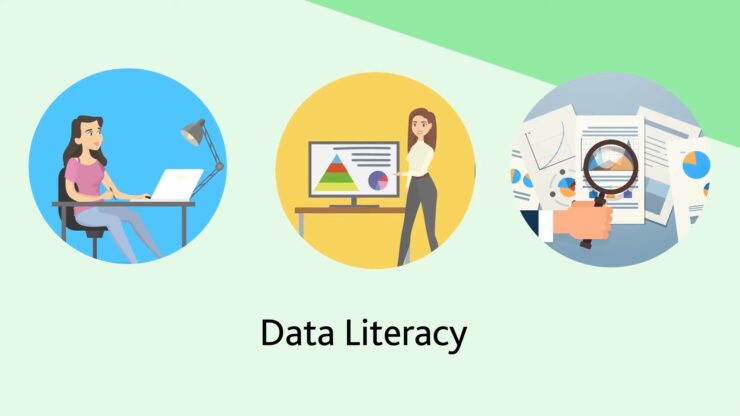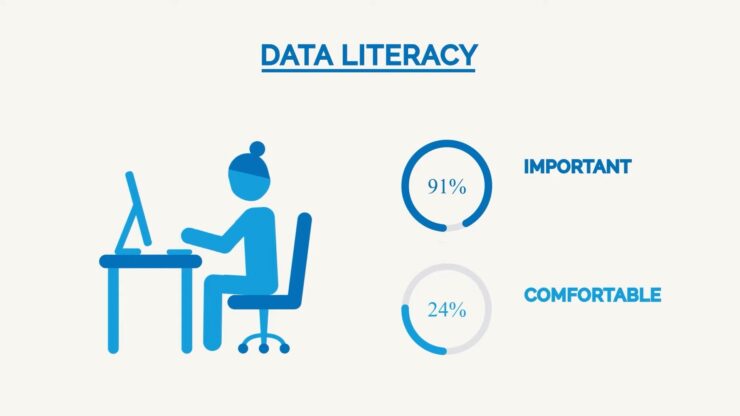While running a successful business has never been easy, it has become even more challenging in today’s dynamic and ever-evolving world. This is because the business landscape is constantly transforming thanks to modern and technological advancements, rapid globalization, and shifting consumer trends.
Therefore, as an entrepreneur, if you want to ensure your enterprise always comes out on top and stays one step ahead, you must be able to navigate these complex obstacles. Fortunately, running a business today also offers unprecedented access to resources that can prove valuable assets for your company, one of which is data. However, acquiring this data is insufficient if you don’t understand it well enough.
And so, here we discuss data literacy, why it matters in your business, and how you can achieve it.
What is Data Literacy?
Although data literacy is a broad term, it primarily refers to the ability to understand, analyze, and derive meaningful insights from a particular dataset. Data literacy can significantly transform the business industry by encompassing technical skills and theoretical understanding. As entrepreneurs, certain degree programs can help you achieve this knowledge so you can apply them to your industrial operations and achieve promising results.
If you’re interested, read more on MBA in data analytics and see how this program can quickly help your business achieve its goals.
Why does Data Literacy in your business matter?
But despite knowing what it is, you might still wonder whether investing in data literacy is worth it. And while there are countless benefits it can provide, below are seven of the biggest advantages it can provide your business.
1. Informed decision-making
Having facts straight is crucial to make the best and most well-informed decisions. With data literacy, you can have a solid and objective understanding of what your data represents that can guide you in making an ideal judgment for your business. Accurate and reliable data can also help convince other investors in the company, who may need tangible proof regarding your decisions.
2. Improves performance and productivity
When it comes to improving performance and productivity in everyday operations, businesses must identify inefficiencies, bottlenecks, and other areas of improvement. With data literacy, you can discover these inadequacies by instilling key performance indicators or KPIs that provide real-time data on how each business process functions.
Insights from this data allow you to implement targeted strategies and initiatives that optimize tasks, streamline operations, and eliminate wasteful practices. Additionally, by establishing performance management systems, you can set realistic and achievable goals for your company, track progress, and make the necessary adjustments as you move along.
3. Provides a competitive edge
Data literacy is a key driver of competitive advantage for businesses in today’s data-driven world. This asset allows companies to study market trends, analyze consumer behavior, and design more effective marketing campaigns. As a business owner, it also lets you measure and track your enterprise’s performance metrics and ensure they align with industry standards. These steps result in greater customer satisfaction and put your brand’s name at the forefront of that particular market.
4. Effective communication
Communication is a key component in the smooth running of business operations and ensuring everyone on the team stays on the same page. Therefore, in this instance, data literacy can empower you to understand, interpret, and communicate complex data clearly and meaningfully. By having a strong grasp of data and its implications, you can effectively convey insights, trends, and recommendations to stakeholders, colleagues, and decision-makers.
This strategy promotes transparency, fosters collaboration, and ensures that information is effectively communicated and shared across teams and departments. It also helps industry professionals ask the right questions, challenge assumptions, and engage in meaningful discussions around data-driven insights.
5. Better risk management
All business operations come with an undeniable level of risk where uncertainty surrounds its profits, approaches, environment, or legal compliance. But while these risks are important in driving business growth, you must take proactive steps to ensure they don’t get out of hand. And so this is where data literacy comes in handy. It enables you to analyze historical data, identify patterns, and detect potential risks early on, urging you to take the necessary steps to minimize potential damage.
Risk management strategies can include risk assessments, scenario modeling, and predictive analysis to anticipate and prepare for different risk scenarios. Moreover, data literacy can help monitor and evaluate risk mitigation strategies, track the effectiveness of control measures, and make data-informed adjustments as needed.
6. Drives business growth
Flourishing sales are often a key indicator of a successfully run business. Therefore, most business owners aim to make as many sales as possible. However, they must determine what the customer wants to achieve this goal. While surveys and polls help collect relevant data, determining useful information is only possible with data literacy.
This is because, using data analytics tools, you can study market trends and industry dynamics to understand customers’ ever-evolving preferences and needs. Instead of investing your capital in a market where there is a “chance” you’ll turn a profit, you can allocate your resources where a return is pretty much guaranteed.
7. Improves forecasting
Forecasting in business helps you predict future trends, results, or possible scenarios based on your plans and finances. It relies on available data and data literacy to accurately calculate and foresee potential profits and losses a business might face. These skills are crucial since they allow you to identify trends and pitfalls early on, giving you plenty of time to take the necessary precautions. Data literacy is also useful in validating your forecasting approaches further by comparing them with the actual outcomes at the end of each fiscal year.
How can you achieve Data Literacy?
Achieving data literacy within your organization isn’t as difficult as it may seem. By following a few simple steps, like the ones below, you may be on your way to achieving it within a short while.
1: Invest in relevant education and training programs on data literacy skills.
2: Promote a data-driven culture within your organization.
3: Provide employees access to user-friendly and intuitive data analytical tools.
4: Exchange ideas across teams regarding best data literacy skills, practices, and approaches.
5: Foster a continuous learning mindset in your workforce.
Conclusion
Data literacy skills are an entrepreneur’s most valuable asset in today’s rapidly dynamic business industry. And since modern technology produces excessive amounts of data daily, it only makes sense to make productive use of them. Therefore, business owners must solidify data literacy in their company culture to drive success and improve business outcomes.


















